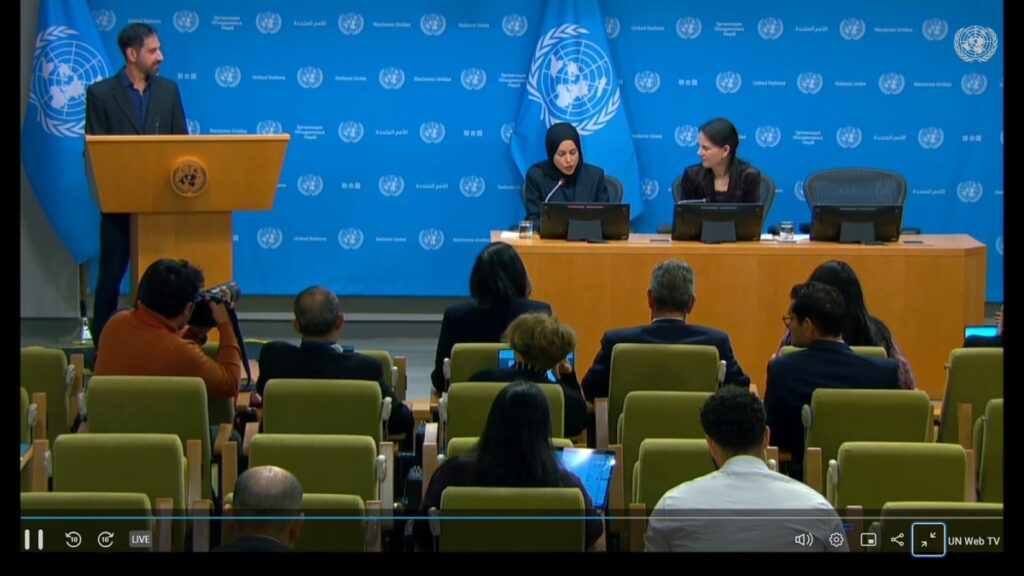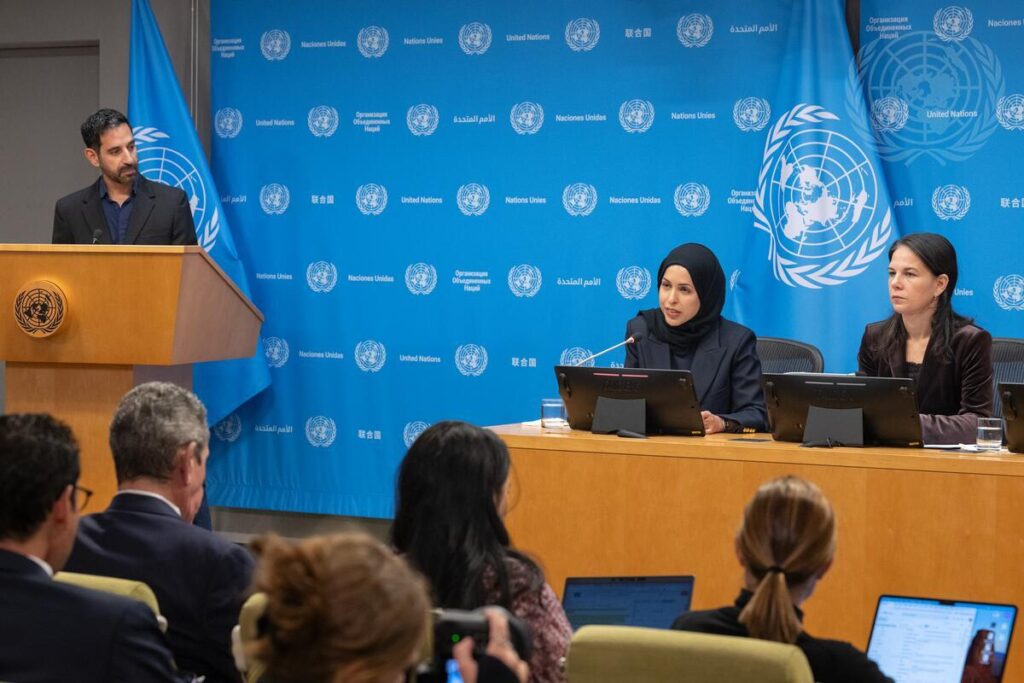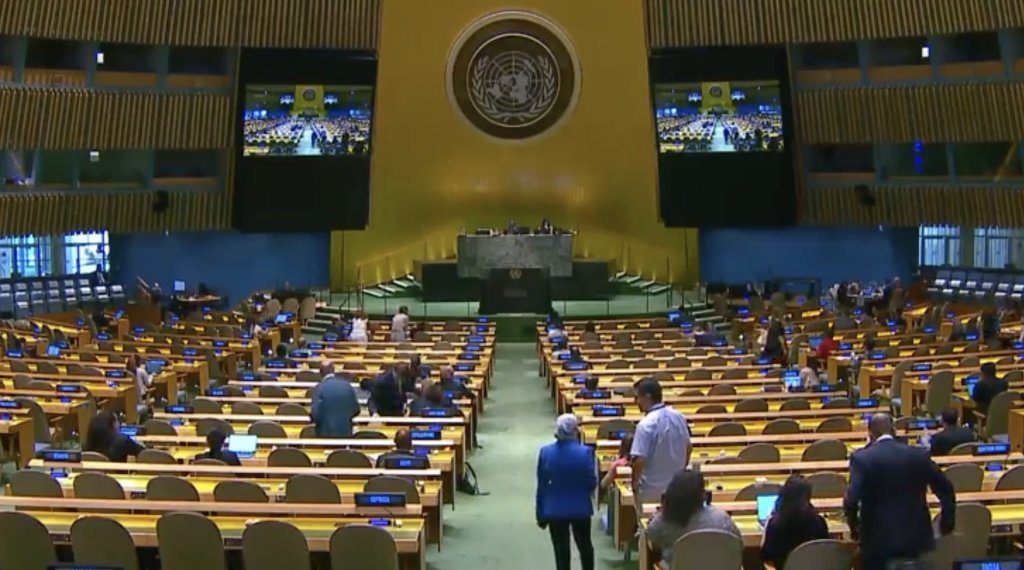The world is set for a powerful moment of solidarity and promise. The Second World Summit for Social Development is about to convene in Doha from 4 to 6 November 2025, and the host nation, Qatar, has already taken a bold step forward by participating in the pre-summit briefing at the United Nations in New York. This gathering promises to re-energize global efforts to tackle poverty, social exclusion, and inequality.
Rekindling A Global Pact for Social Development
Qatar, represented by its Permanent Representative to the UN, Sheikha Alya Ahmed bin Saif Al-Thani, took part in the briefing alongside the President of the 80th Session of the UN General Assembly, Annalena Baerbock. Their message was clear: this summit is not just a meeting, but a defining moment for social justice. The event marks the renewal of global commitment to putting human beings at the heart of sustainable development.
Qatar emphasised its honour at hosting the event, welcoming over 8,000 representatives of governments, inter-governmental organisations, civil society, academia, private sector, and youth.
This summit comes 30 years after the original World Summit for Social Development in Copenhagen, renewing momentum to accelerate progress toward the 2030 Agenda for Sustainable Development and the Sustainable Development Goals.
Why Doha and Why Now?
As the host city, Doha is being positioned as more than a meeting place it is a symbol of renewed global solidarity. Sheikha Alya noted that the summit will culminate in the adoption of the “Doha Political Declaration,” which emphasises that eradicating poverty, creating decent work opportunities for all, and achieving social inclusion are inseparable pillars of sustainable development.
Crucially, the summit is set at a moment of pressing urgency: despite progress over decades, large parts of humanity still face deep poverty, inequality, and marginalisation. The briefing underlined that social justice, human rights, and sustainable development must be treated as interconnected, not separate objectives.
Qatar’s track record of hosting major global development and environment gatherings also adds context—from the 2008 Financing for Development Conference to COP18 and more recently the Least Developed Countries (LDC5) conference in 2023. Doha is now reopening its doors for a social development summit of this scale in the global south.
Key Themes: Social Justice, Inclusion and Action
At the heart of the summit are three interlinked themes:
- Eradicating poverty – acknowledging that it remains a blight on global progress and must be tackled with renewed urgency.
- Decent work and full employment for all – recognising that economic growth alone isn’t enough; jobs must be fair, inclusive, and sustainable.
- Social inclusion – ensuring everyone, especially the most vulnerable, has opportunities, dignity, and a voice.
These pillars form the backbone of the forthcoming Doha Political Declaration. The briefing emphasised that achieving meaningful progress requires linking these elements to create a robust social contract for the future.
Beyond high-level declarations, the summit aims for practical commitments and measurable outcomes. Qatar expressed confidence that the summit will produce genuine pledges and actionable follow-through.

Why This Summit Matters for the World
We live in an era of converging challenges: escalating inequality, rapid technological shifts, climate crises, and demographic change. The summit is designed as a platform where governments, UN agencies, civil society, the private sector, and youth come together in one space to chart a new phase of cooperation.
For many countries and communities, it offers the chance to turn promises into practice. The summit could influence national policies on social protection, labour rights, inclusive education, and bridging social divides. It is a reminder that development isn’t only economic growth it is about human dignity, opportunity, and justice.
For host Qatar, being at the centre of this dialogue highlights the country’s ambition to be not just a regional player, but a global catalyst for social progress.
What to Expect in Doha
The summit’s programme promises a rich mix of high-level events, parallel sessions, and stakeholder engagement. Among the highlights:
- The inaugural meeting of the “Global Alliance Against Hunger and Poverty” signaling a renewed drive to eradicate extreme poverty and hunger.
- The “Doha Solutions Forum for Social Development” designed to move beyond talk and into practical solutions, drawing in private sector, civil society, and youth voices.
- Engagement of over 8,000 participants from across sectors: governments, UN bodies, academia, business, youth, and civil society. This large-scale participation signals a truly global gathering.
- Adoption of the Doha Political Declaration, which will include follow-up, review mechanisms, and commitments to translate words into action.
The Human Element: Why People Everywhere Should Care
At the human level, this summit has implications for everyone whether in Mumbai, Doha, New York, or Lagos. Here’s why:
- Imagine a parent in a rural community finally accessing decent work, social protection, and a stable income so they can support their children’s education and futures.
- Or a young graduate, part of the global youth cohort, feeling the world supports their inclusion rather than leaving them behind.
- Or a person living with disabilities, whose rights to participation and opportunity are explicitly affirmed in global policy rather than neglected.
These aren’t just lofty ideals they affect lives. The summit’s success could mean stronger social safety nets, fairer workplaces, inclusive societies, and a renewed social contract that says every person matters.

Challenges and Opportunities Ahead
Despite the bold ambitions, the road is not without hurdles. Key challenges include:
- Ensuring that commitments don’t stay on paper but translate into national-level policies and budgetary allocations.
- Bridging the gap between high-level declarations and grassroots implementation, especially in underserved regions.
- Coordinating among many actors governments, private sector, civil society, youth so that cooperation is genuine, inclusive, and sustained.
- Tracking progress meaningfully to ensure the summit becomes a milestone, not just a meeting.
Yet, the opportunities are equally significant:
- The chance to recalibrate the global social agenda at a moment when many feel left behind or marginalised.
- The momentum generation: hosting in Doha leverages a region of growing influence and offers fresh perspectives to global development debates.
- The possibility of amplifying voices from civil society, youth, academia, and private sector in new ways—ensuring that development is inclusive and shaped by many, not just a few.
- The chance to reintegrate social justice into global development, at a time when the world risks focusing too much on growth and technology without equity.
Reflections on Qatar’s Role
Qatar’s role as host is more than logistical. By chairing this summit, Qatar embraces the mantle of global convenor for social development. It signals that social justice isn’t only a Western concept but a universal one.
The choice of Doha also offers symbolism: bridging North-South dialogues, leveraging a country that has built major global infrastructure and now turning attention to people-centred development. It reflects the idea that the Middle East and Gulf region can be a space of global dialogue, not just economic growth.
In her remarks, Sheikha Alya stressed that Qatar is honoured to welcome the world and sees this summit as placing human beings at the heart of the sustainable development process. That phrasing matters it shifts the focus from abstract targets to real people and real lives.
A Personal Appeal: Why Your Voice Matters
Even if you are not a government delegate or part of big NGOs, your voice matters in this global project. Why?
- Because social development is rooted in local realities. Policies made in Doha will ultimately need local champions in communities, workplaces, schools, and neighbourhoods.
- Because the summit invites participation from youth, private sector, academia, and civil society. If you are engaged (or want to be) in any of those spheres, you are part of the story.
- Because the goal is “no one left behind”. That means every individual matters, from informal workers to students to local activists.
So consider this: What does social inclusion mean in your context? What decent work opportunities exist around you? How is poverty defined in your community, and how might solutions look different than typical narratives?
These are questions worth bringing into your own world and if global leaders use this summit to spark real change, your day-to-day life could be positively impacted.
Looking Forward: Beyond Doha
The summit is not an endpoint it is a stepping stone. The adoption of the Doha Political Declaration will signal ambition, but the real merit lies in the follow-through.
For the 2030 Agenda to succeed, the next years will be critical. The world needs renewed partnerships, financing, innovation, and inclusive policies. The success of this summit may revive hope for a more equitable future.
In the weeks and months ahead, stakeholders governments, local communities, private sector, youth, and civil society must keep up the momentum. The spotlight in Doha is bright; now it’s time to let that light shine on action, not just words.
Conclusion
The participation of Qatar in the pre-summit briefing for the Second World Summit for Social Development underscores a moment of promise for humanity. Hosting over 8,000 global stakeholders and committing to sustainable, inclusive outcomes places the summit in Doha as more than a conference it is a call to action.
If this summit lives up to its promise, it could mark a shift where global social development moves from statements to deeds; where people are genuinely placed at the core of development; where inclusion, dignity, and opportunity become non-negotiable pillars of progress. The world will be watching, and the world will benefit.
Do follow Gulf Magazine on Instagram.
Also Read – Qatar and UN Unite to Protect Children in Conflict Zones | Global Partnership for Hope and Safety



